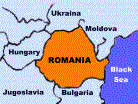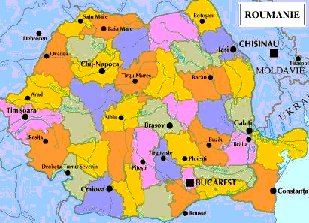![]() Pagina externa --->
Pagina externa --->
Article issued in the “Homéopathe International” in
French
THE
HOMEOPATHY IN ROMANIA
By
Dr. Ioan Teleianu
|
In
|
|
||
|
But also,
like everywhere else in the world, with the same certainty, the homeopathy was
given an impetus by the therapeutic results and, most of all, by the cured
patients, these undisputed and tireless seekers for beneficial solutions of
the true medicine. Thus, starting with the most fertile period of the homeopathy, the Hahnemannian one, the writings are mentioning the existence, in some localities on the Romanian territory, of isolated homeopathic physicians, contemporary with Hahnemann, as well as drugs considered to be “miraculous”. By their exploits, these have drawn the attention of the population and of the authorities to this strange and “curious” therapeutic method. It is understood that these documents deal with he homeopathy not in a laudatory manner or to make it known in a favorable way, but rather as a reference of some obstacles and conflicts that came about with its unusual appearance. Most of these conflicting aspects were connected to the uncommon modalities of the posology, the manner of preparing and distributing the remedies, all these not being very orthodox with respect to the sanitary laws. In spite of all these reactions, we may consider that the homeopathy, at its beginning, was rather tolerated than restrained. And this will continue in the same way, for more than a century. It may be of an illustrative importance to make some
remarks that are interesting in a picturesque way. In the documents regarding
the history of medicine one can find the year 1840, as the first date
mentioning the practice of homeopathy in Romania, when several homeopathic
physicians, who came from or were educated abroad, were giving homeopathic
consultations. Dr. Eduard Spech, for instance, who had studied in Wien, had a
consulting room in In 1863, following most probably the increased development of consulting rooms of homeopathy and also the intensification of the conflicts with the laws, The Superior Sanitary Counsel (kind of a health department of the time), lead by Dr. Carol Davila, had decided to forbid the homeopathic practice in public establishments, permitting it only in private consulting rooms, “...like in other countries”. It is certain that the few oppositions to the homeopathy were the result of the too fast and uncontrollable penetration of different practitioners that turned up from everywhere, “healers” who pretended to be “homeopaths” and, maybe, of some abuses, inherent to the situation of the beginning of this discipline.
In spite of all difficulties, it is undisputed that, in In time, the homeopathy has stayed in abeyance for decades, without stopping its sinuous path. The number of physicians has grown and also has that of homeopath chemists, then, here and there, the greatest practitioners have attracted disciples, etc. But, unfortunately, for many decades the status of homeopathy did not undergo significant changes. Autochthonous publications were scarce, collective efforts in order to impose the method lacked because of the scattering of the homeopath physicians, including the absence of initiative for the achievement of a coherent connection between them. And this continued until the Second World War, moment that has found the Romanian homeopathy in the presence of some remarkable values represented by excellent allopathic physicians who have dedicated themselves to the study and practice of homeopathy. These physicians had the possibility, due to their competence, to show in an indisputable manner the material results of homeopathy to their allopathic colleagues, leading to the arising of a fortifying esteem for their performances and for the method. All these specialists had the professional positions that allowed them to establish connections with the great characters of the European homeopathy. Between the wars and after the war several practitioners have asserted themselves, among whom one can find some resounding names: Dr. N.Nicolicescu, eminent specialist in the infectious – contagious diseases who had preferred the homeopathy instead of a university career, at the moment when he was brilliant in his allopathic specialty, Dr. Constantin Barbulescu, author of many works of homeopathy, Dr. Petre Georgescu, renowned surgeon, Dr. C. Fulga from Ploiesti, Dr. Tiberiu Ionescu, former student of Dr. Pierre Schmidt from Geneva, Dr, Aurian Blajeni, surgeon and gynecologist, author of a monumental monograph about the homeopathic doctrine and contributor to the French homeopathic reviews, the chemist Victor Iacobi, a great animator of pharmaceutical homeopathy, Dr. Alina Papazol – Drimba, a great specialist in radiology and an ardent militant of the first homeopathic meetings that were initiated at that time, Dr. Gheorghe Bungetzianu, the doyen of today’s Romanian homeopaths, eminent pneumatology specialist and author of works, Dr. Ramiro Tomescu, neurology specialist, excellent self-educated homeopath, the chemist Cezarina Tuchel, who, by her chemist’s shop has played the part of connection between the different generations of homeopaths, from yesterday and today, etc. An impressive theoretical support, during these last 30 years, came from Prof. Dr. Victor Sahleanu who, through his well known erudition and his countless publications about the doctrine in medicine, has favored a better comprehension of the homeopathic truth and of its basis established on infallible researches. Towards the year 1970, the initiatives for regrouping the physicians were intensified and we witnessed, at that moment, the first meetings for a more structured joint work, with a view to exchanging experience. These have stimulated sporadically the movement in favor of the acceptance of the method and thus even determining the Ministry of Health to deliver, for a certain number of physicians, the authorizations for practicing homeopathy, with some restrictions. At this moment the interest for the creation of a homeopathic society was born, taking into account the first types of continuous training through professional meetings with presentation of the reviewers and essays about their work. A very special event took place in 1980 and it has played a decisive part in the recent development of the Romanian homeopathy. It was the time when great economical difficulties accumulated in the country. Among them, there was a cruel shortage of medicines and means of all kinds for the health department, all these making impossible not only the usual importation of medicines but also the importation of raw materials for the home industry. At this moment, (which, I believe so today, proved to be providential for the Romanian homeopathy) the Ministry of Health, well advised by some of us, understood and accepted immediately the idea that the most pertinent decision was the one of making appeal to this inestimable source of health which is “mother nature” and its means and also to promote certain non harmful therapeutic methods, significantly developed world wide, like: phytotherapy, homeopathy, acupuncture. And then something stupefying took place, The Ministry of Health itself, took over the charge of organizing, through its “Post-University Improvement Center For Physicians And Chemists” of initiation courses in these fields, for physicians, thus stimulating the best practitioners of these methods to teach this sui-generis learning. As it was about insufficiently known fields, it was necessary to establish an adequate strategy, the first classes of physicians were selected by very severe criteria, concerning the specialty formation and professional behavior, the deontology. This was necessary in order to put into play, at this moment of the adventure of the beginnings in homeopathy, at least the professional authority already acquired and recognized by their colleagues and in the end in order to impose progressively and with caution the doctrine. That was a total exploitation of what was possible under a centralized state, where the emergence from the center to the purlieus was the only direction. Immediately after the first graduates, the Ministry of Health had officially settled the homeopathic practice in the territory, by means of a decree, settlement that exist in Romania ever since. The homeopathy presented during the initiation courses was conceived, as it is, as a complementary therapeutic medical discipline, in the overall frame of the medicine, the graduates being able to use the homeopathic treatments either in public establishments (at that moment this was a rule) or, later, in private. From the very beginning, the demands were huge, regarding the number of participants, because the only criterion was to have a solid medical background. For us, this basic and specialized medical formation is considered as essential and decisive for the perfect comprehension of the homeopathic medical act and for the total assumption of the responsibility. Until now, more than 2300 physicians have graduated the complete homeopathic training, conceived in three learning cycles, dispersed over three years. In 1999 we have organized four new first-year courses
(in One must understand that a part from the first classes
didn’t stay in the homeopathy. One can learn homeopathy in courses, but in
practice, it is the homeopathy that chooses its apostles. Even more, at the
beginning there was only one homeopathic chemist's shop in the whole country,
in
These twenty years of homeopathic education, thanks to
the effort of Romanian teachers who have trained themselves by working in
this field, contributed to the fact that in One can see, here, among the young physicians,
unchallenged values in homeopathy, who practice exclusively this medicine and
aim to superior forms in order to optimize their performances. These last
years, we were supported in our efforts by west countries, mainly by In 1980 we started our path with almost nothing, just 4-5 homeopathic militants and a few books. Today, in Romania, there are institutes, establishments, foundations, hospital, consulting rooms, etc. all dealing with homeopathy, a whole drugs industry, chemists everywhere, connections with other countries, reviews and other publications, etc. The Romanian Homeopathic Society, among other activities, organizes every year a national congress, which is more and more imposing. These are realizations that have strengthened the status of our therapeutic discipline and let us believe that God has helped us a lot. Or maybe, in his old times, the genius Hahnemann – the one who, it must be told, has spent 2 years in Sibiu (ancient Hermanstadt), here, in Romania, when he was making his debut in medicine – could find out something undiscovered in our traditional medicine (he recognized that in an article published in 1784) – and left us in change or as a souvenir of his possible nostalgia and of his passion, a ray of spiritual light that, having the force of great homeopathic potence enlighten the way for us all. Dr. Ioan Teleianu President of the Romanian Homeopathic Society Presentation of the author: Dr. Ioan Teleianu is the exercising president of the Romanian Homeopathic Society (since 1992) and professor, responsible with the methodology of the Romanian homeopathic teaching. He was an expert in medical pedagogics for the World
Health Organization (1969 – 1973) and director of the “National Center For
Continuous Training And Post-University Perfecting For Physicians And
Chemists” (Institute that is subordinated to the Ministry of Health in Sylvain Cazalet “Homéopathe International” |
|||


